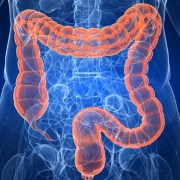 Photo: Getty Images
Photo: Getty Images
This week in my office, a 53-year-old woman complaining of gastrointestinal issues refused to get a colonoscopy because she was afraid of the ‘prep’ required the day before. Unfortunately, her mother and uncle died of colon cancer, which constitutes a pretty strong family history. I realized her concern about the "clean out" process trumped her potential for cancer given the genetics.
Colon cancer (also known as colorectal cancer) is the third most diagnosed cancer in the world. Symptoms can vary widely from nothing to rectal bleeding (red or black), new constipation or diarrhea, change in stool size (such as pencil-thin), mucus, abdominal pain, or bloating. Blood loss in the stool is the most consistent symptom and it's important to not ignore it or chalk it up to hemorrhoids.
What should you do if you suspect something? Make an appointment with your health care provider and don’t be afraid or embarrassed because it involves your colon. Your provider will check for hemorrhoids and perform a rectal exam checking for lumps, bumps, or any lesions. You will probably be given a fecal occult test which is a card that checks for blood in the stool if not done after the rectal exam.
A colonoscopy is typically recommended starting at 50 years old unless you have a history of polyps, irritable bowel disease (such as crohn’s or ulcerative colitis), or a family history of colon cancer. Then it is recommended much earlier. This differs from a sigmoidoscopy that only exams the rectum and lower colon as opposed to the entire colon.
Risk factors include: age, family history (like my patient above), a history of adenomatous polyps on prior colonoscopy, smoking, a diet high in red meat, a history of inflammatory bowel disease, a low fiber diet, obesity, low vitamin D levels, and increased alcohol intake.
Many of these risk factors are modifiable and should be taken seriously especially if you have a family history or a history of polyps or inflammatory bowel disease.
A colonoscopy is a procedure that involves a lighted scope inserted into your rectum and slowly moved through your entire colon in order to visualize any concerning areas and check for polyps. Typically the prep work involves about twenty-four hours of fasting (except for certain approved liquids and broths) while taking a liquid laxative to clean out the colon.
For visualization purposes, it is important that your colon is completely empty. If you cheat and the doctor is unable to see you may have to repeat the entire procedure. Many patients prefer a light sedative during the procedure to complete anesthesia in order to speed recovery.
From start to finish, the entire procedure generally takes less than an hour, with another thirty to sixty minutes needed for recovery. All tissue samples (biopsies) taken will be sent for pathology in order to determine if it is normal or concerning.
If you are having abnormal digestive complaints, are fifty years of age or older, or have a family history of colon cancer, don’t let your fears keep you from getting appropriate screening. Make an appointment with your health care provider and avoid being a statistic.
References:
1. Colorectal Cancer Screening and Prevention in Women. Web. 3 November, 2011.
http://www.medscape.com/viewarticle/739958
2. Alcohol Linked to Colorectal Cancer Risk. Web. 3 November, 2011.
http://www.medscape.com/viewarticle/749886
3. Colorectal Cancer Screening Among Primary Care Patients
http://www.medscape.com/viewarticle/746400
4. National Digestive Diseases Information Clearinghouse: Colonoscopy. Web. 3 November, 2011.
http://digestive.niddk.nih.gov/ddiseases/pubs/colonoscopy
Reviewed November 4, 2011
by Michele Blacksberg RN
Edited by Jody Smith
